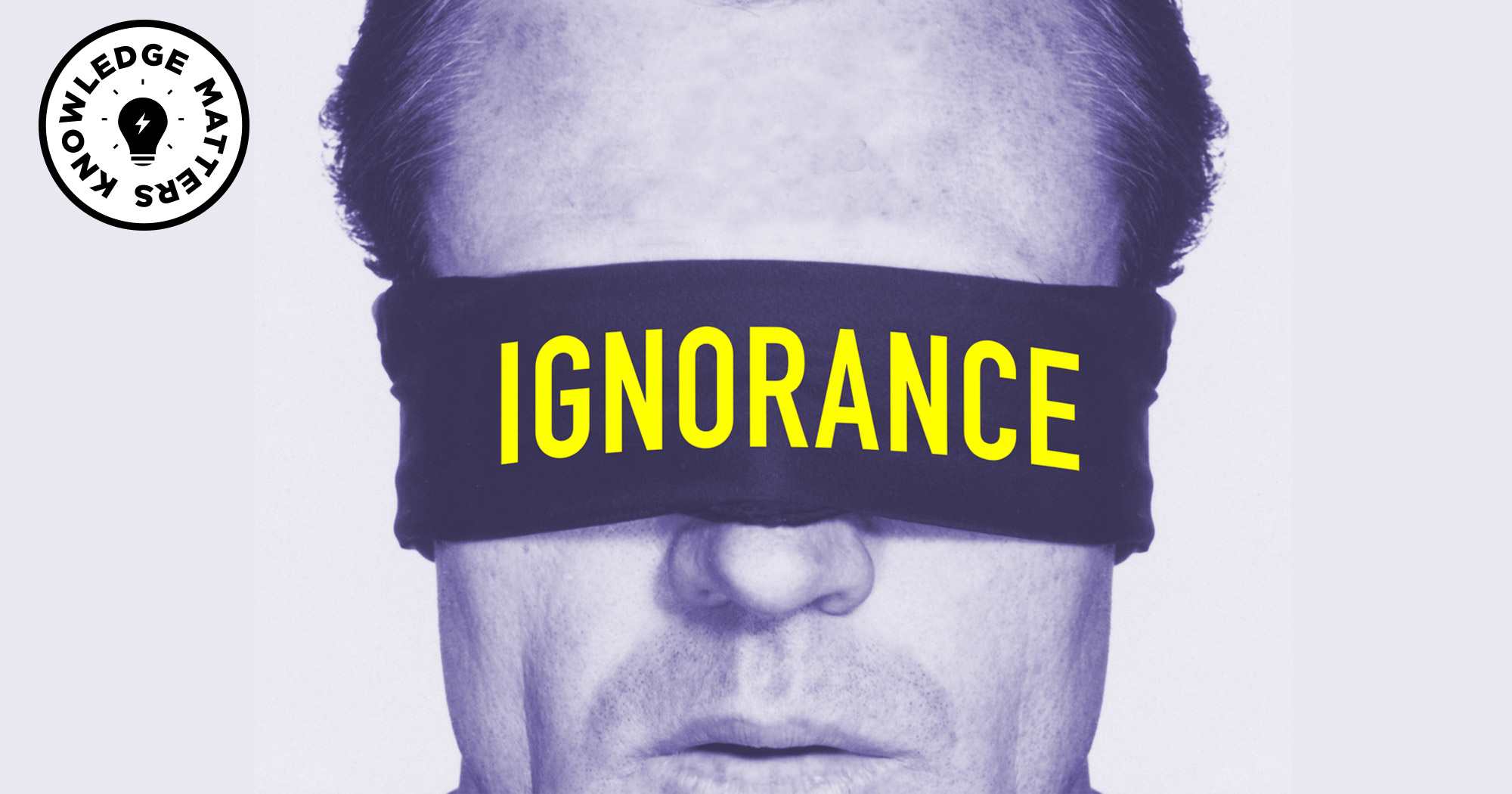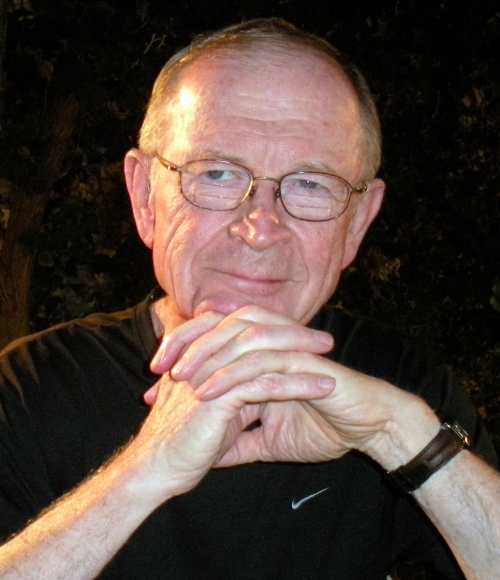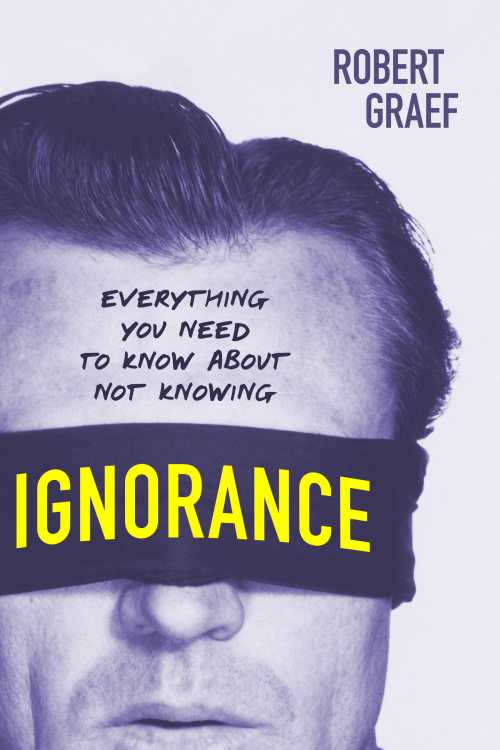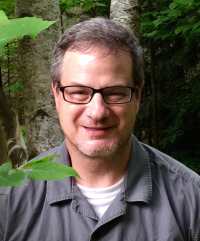Knowledge of Ignorance Can Propel Us Forward

Ignorance is a superpower. And, like any superpower, it can be used for good or for evil. In these times, most of us are all too aware of the price paid for ignorance. It can set back progress for generations. But knowledge of one’s ignorance is what drives scientists—-a burning need to know the correct answer to a question. Self-aware ignorance can drive society forward. Ignorance is a subject that so fascinated Robert Graef, a retired journalist, teacher, and businessman, that he decided to write the book about lack of knowledge. Ignorance: Everything You Need to Know About Not Knowing, published by Prometheus Books, looks at how ignorance can be harnessed for destructive and constructive purposes. I had a few questions for him about knowing nothing.
Is the most difficult thing about ignorance the acknowledgement that we are ignorant? Doesn’t ignorance hit humans where they are most vulnerable: their pride?

Robert Graef: "Lives governed by closed-minded ignorance will be inflexible."
Pride associated with knowing is strongest in people who know the least. If this seems odd, consider how acknowledgment of personal ignorance is easy or difficult depending on the size of one’s knowledge-base. Lifelong students understand that a lot of the stuff they’ve absorbed is about as useful as junk in an attic. They’ve seen facts disproved and beliefs undermined so it’s no big deal when they’re faced with cause to abandon faulty knowledge.
For the educated, whether self-educated or formally educated, pride in knowledge is based less on heaps of facts than understanding how they work in people’s lives. This isn’t the way of unfortunates who don’t know much and use the little they do know to insulate themselves against incursions of outside knowledge.
One test that compares knowers with not-knowers lies in how they tend to defend their knowledge-bases with ferocities that are inversely proportional to their amounts.
When you’re young, you think you know everything. But, it seems, the older I get, the more ignorant I feel. Is that normal?
For a young child, everything beyond the comfort of a mother’s breast is new. Such a child’s receptors are so busy absorbing impressions of newness that they stand (or crawl) as models for perfect ignorance. No frames or prejudices impede their absorption of knowledge. It takes time for them to acquire the beginnings of imperfect ignorance; comparison and discrimination, traits that education struggles to keep in proper perspective.
Public education holds the responsibility for keeping young minds open for it is only adults with depth and breadth of knowledge who are equipped to re-approach the open-mindedness of childhood’s perfect ignorance. Of course there are some who develop road maps for life early on and never revise them. They may be comfortable in youth but they grow brittle in age as their changed world comes into conflict with the maps by which they live.
Lives governed by closed-minded ignorance will be inflexible.
Are we too cursed by ideology these days to admit that we are ignorant?
A definite inclination toward ignorance is built into ideologies, isms, tribes, and cults. It is seeded during their formative processes as they develop creeds, gang colors and fist-bumps, mission statements, party platforms, taste in dress, and whatever else it takes to identify members as members.
Children of West African tribes undergo special patterns of facial scarring. Certain religious cults dress their women in retro outfits. Ideological definition suffers from being closed-ended, sharing that limitation with framing; that is of selective acceptance and rejection of whatever stands outside inflexible boundaries or frames. Thinking people require more flexibility and openness than ideological membership can provide.
Your book delves into religion, too. Is it truly possible to have religious faith while also acknowledging science?
Religion is probably the best incubator for ignorance; an observation drawn from sixty years of Christian service and experience. The obvious fact is that much of the church is so stuck in the past that it appears to be struggling to contain its omnipotent God in a historical box. Meanwhile, the work of understanding that God’s creation has been picked by science as it plumbs the inner workings and distant reaches of the physical universe.
Science’s findings routinely upset orthodoxy with indisputable facts that challenge traditional interpretations of holy documents. Some observers openly wonder if scientists might actually be seen as priests in the future.
As traditional church leaders continue to deny new knowledge by posing as Guardians of the Faith, a movement is afoot to bring Christian scholarship and science into harmony by responsibly reinterpreting key traditional teachings as inspired instructional myths rather than historical facts.
Why is ignorance still so prevalent during a time when more information is available to everybody?

Read the rest of our Knowledge Matters series
Ignorance is more than prevalent. It advances geometrically. Every new discovery opens new windows to the unknown that beg to be explored. “Not knowing” stands inside the windows while the unknown beckons from without. A polar tension akin to that which draws lightning bolts from sky to earth connects our state of ignorance with the lure of the unknown. New questions probe and grasp bits of cosmic reality that have even added entire dimensions of existence to that which science knows it doesn’t know.
This expansion of not-knowing humbles scientists as their bases shrink in comparison with the burgeoning unknown. One might imagine the cause for scientists’ acknowledgment of ignorance as rooted in finding that, as they draw knowledge from the cosmic well, they find that the well becomes deeper and wider with every bucket of knowledge they draw forth.
Are you ignorant?
Of course I’m ignorant, just as everyone is ignorant. But I am fortunate in having a somewhat realistic view of my lack of knowledge. My desire to know what I don’t know is an intellectual stimulant. It’s what causes children to shake and palpate wrapped packages under Christmas trees. It’s what caused Columbus to sail off into the unknown. It is recognition of our ignorance that helps us to realize that we are small enough to stand in awe of the Great Unknown. To top it all, life would be dull and disappointing if we had all the answers.
—-

Howard Lovy is executive editor at Foreword Reviews. You can follow him on Twitter @Howard_Lovy.
Howard Lovy
